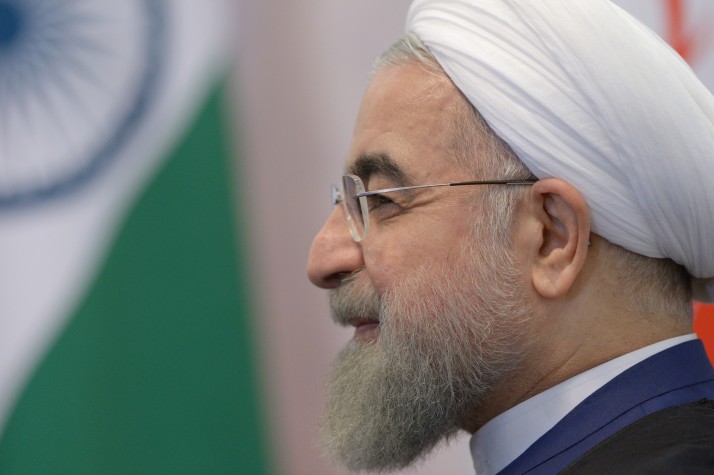Rouhani Vows to Shed Iran Sanctions as Trump Piles on More

EghtesadOnline: A day after winning re-election last month, Iran’s President Hassan Rouhani reaffirmed a campaign pledge: that he’ll find a way to free his country from sanctions that hobble its economy.
That’s a vow President Donald Trump and U.S. lawmakers are making harder than ever to keep.
According to Bloomberg, Trump used his first overseas trip last week to portray Shiite-led Iran as the embodiment of evil, the common enemy that could bring America’s Sunni-led Gulf allies together with Israel to achieve Middle East peace. In Washington, Republicans in Congress are also doubling down, pressing for legislation to add more sanctions, not lift those that remain after the 2015 nuclear deal between Iran and world powers.
Against those odds, Rouhani’s best bet after taking 57 percent of the vote is to get the blessing of Supreme Leader Ayatollah Ali Khamenei to seek negotiations with the U.S. while cultivating European leaders to work around the restrictions, said Elizabeth Rosenberg, a senior analyst at the Center for A New American Security.
“If Iran was to offer an arms control discussion, which could also involve regional stability, there are some in the Trump Administration that’d be intrigued,” Rosenberg said.
That’s far from a sure bet. Trump has repeatedly called the nuclear deal “horrible.” When the State Department in April drafted a letter to Congress certifying Iran’s compliance -- a requirement that surfaces every 90 days -- Trump personally intervened to inject tougher language.
His secretary of state, Rex Tillerson, said the accord was “another example of buying off a power who has nuclear ambitions. We buy them off for a short period of time and then someone has to deal with it later.”
But Trump hasn’t cut off all avenues with Tehran. A $16.6 billion deal for Boeing Co. to sell 80 airplanes to Iran Air “remains on track,” Chief Executive Officer Dennis Muilenburg told reporters May 1, despite efforts by some Republicans to get it quashed.
At home, Rouhani’s overwhelming victory could give him the clout to seek flexibility in curbing Iran’s ballistic missile program, its support for Hezbollah and the militancy of the Iran Revolutionary Guard Corps. Those are areas where Iran’s supreme leader, rather than its president, holds sway -- and all have been cited by the U.S. as reasons to sustain or add sanctions.
‘Signal of Interest’
“Rouhani’s campaign pledge to remove non-nuclear sanctions underscored the priority his government was prepared to place on growing Iran’s economy,” said Suzanne DiMaggio, senior fellow at the New America Foundation, a research center based in New York. “Despite the obstacles, it also was a signal of interest in improved relations with the U.S.”
The economy’s performance since the nuclear deal was a key element in last month’s election, with opposition candidate Ebrahim Raisi trying to rally working-class and rural supporters. While inflation has slowed and growth rebounded in recent years, a combination of lower oil prices, reduced state subsidies and the Central Bank of Iran’s tight monetary policy have conspired to keep poorer Iranians from feeling much improvement in their standard of living. Unemployment has edged up to 12.7 percent from 10 percent over the past four years, according to official figures.
Rouhani must “ride on the popular backing he got through high votes, keep supporters mobilized and with this, negotiate domestically,” said Davoud Hermidas-Bavand, an international law professor in Azad University in Tehran. “Otherwise he will face one obstacle after the other at home, which will in turn weaken his position in any in international negotiations.”
Limited Power?
But even with his victory, Rouhani’s powers to create change are limited. The conservative establishment was seen as backing his rival in the election, and while Khamenei grudgingly approved the nuclear deal, he has repeatedly criticized the U.S. for its sanctions.
“Rouhani made a mighty promise but the real question is whether he is in a position to deliver change within the Iranian polity,” said Richard Nephew, a senior research scholar at the Center on Global Energy Policy and former negotiator on the Iran nuclear deal. “The kind of commitments the U.S. wants is probably more than what Rouhani will be able to deliver.”
While acknowledging that Iran is complying with the nuclear accord, the Trump administration has ratcheted up restrictions linked to its missile program and support for terrorism, adding a series of individuals and organizations to existing lists.
“If Iran stops its malign activities, then the sanctions will also stop,” perhaps after negotiations of the kind that preceded the 2015 accord, said Mark Dubowitz, chief executive officer of the Foundation for Defense of Democracies, a Washington-based organization that helped lead opposition to the nuclear deal.
Meanwhile, led by Republican senators including Marco Rubio of Florida, the Senate Foreign Relations Committee voted 18-3 last month to introduce new sanctions against Iran, including designating the Revolutionary Guards as a terrorist organization. The measure could receive full Senate backing this month.


